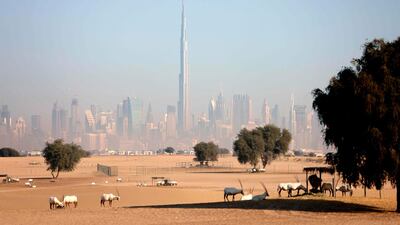News that the UAE has struck a deal to manufacture the Sinopharm Covid-19 vaccine highlights the role the country is playing in the global pandemic response.
The nation has already achieved an astonishing rate of eight vaccination doses admitted per 100 people. This is the second highest figure globally, after Israel and ahead of Bahrain. This new manufacturing agreement, therefore, fits into a wider pattern of the country leading efforts to free the world from grips of Covid-19.
Since the virus emerged the year before last, it has tested the speed at which individual countries act in an international crisis. Nations have diverged in their case numbers and fatalities, in some cases to tragic extremes. The push to inoculate populations is now at risk of widening the public health gap, as some countries accelerate their vaccine drives quicker than others. But herd immunity is a shared objective across the whole of humanity. Each jab delivered is not just an individual success and heavy dose of relief, but also a crucial step in achieving long-term goal of ending the pandemic.
The crux of herd immunity is to inoculate a sufficient percentage of the population to make it difficult for a virus to find enough hosts to carry on spreading. The threshold varies, depending upon the infectiousness of a given disease. For measles, the figure was as high as 95 per cent. Experts are not yet able to estimate the proportion necessary for Covid-19.
The emergence of new strains of Covid-19 in the UK and South Africa sheds light on the challenges of vaccination and the necessity of quick, decisive efforts. There is no reason thus far to suggest that either of these strains is resistant to vaccines already in development. But they are evidence of the fact that the virus is in constant mutation, and future strains may prove more problematic. Medical experts believe that speedy, mass inoculation is the best way to outpace such mutations. With such a small percentage of the global population vaccinated, nations risk being slow at their peril. And if resistant variations do emerge, the world will need another round of costly and time-consuming vaccine developments.

It is not only less well-resourced countries that are struggling to vaccinate, but many of the most advanced as well. This underscores the necessity of governments to formulate effective inoculation strategies, even as new vaccines are under development and trial periods. In the US, for example, vaccination targets have fallen well below a target of 20 million people by the end of 2020.
Capacity, across all areas, has been a major concern during the pandemic. Early on, many worried about the numbers of beds and ventilators in hospitals and then the number of Covid-19 tests. Currently, governments are haunted by their limited ability to inoculate populations fast enough.
Fighting Covid-19 is ultimately a matter of commitment and capacity-building. Countries must work in tandem to continue developing as many resources as possible, as widely distributed as possible, in the areas of testing, information-sharing, economic support, public messaging and vaccination. With the UAE and others now manufacturing leading vaccines, the tide of the pandemic is all the more likely to reverse.


